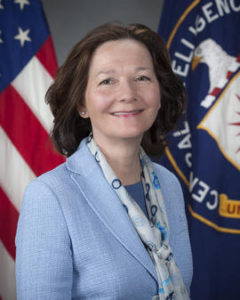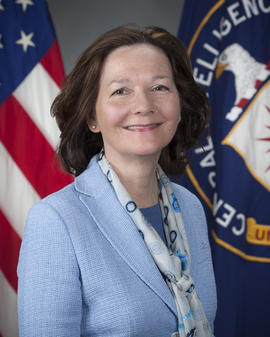By Saga Ringmar

Photo Source: CIA
Gina Haspel has been working at the CIA for three decades. During her time at the agency she was known as the brightest and most successful in everything she did. Haspel took part in undercover operations, recruited Russian agents, and survived coup d’etats — and now, just weeks ago, she was chosen as the first female director of the CIA. Is this a win for feminism? Is she the female James Bond we have been waiting for?
… She would be, if not for the torture. Haspel’s appointment has been surrounded by controversy. In 2002 Hapsel oversaw a CIA detention site in Thailand where waterboarding took place. In 2005 she was chief of staff to the director of the National Clandestine Service, Jose Rodriguez, who ordered all tapes of the torture to be destroyed. As she has spent most of her career undercover, Haspel’s biography is blurry and calls for more transparency have been ignored.
Yet the media never lets us forget she will be the first female to hold this position. So how should we feel about this? It is not the first time a powerful female has emerged onto the world stage with a dubious past or contested ideas.
Myanmar’s first state counsellor and de-facto Prime Minister, Aung San Suu Kyi, is today swamped in criticism after her unwillingness to act against the ethnic cleansing of the Rohingya orchestrated by her own military. Condoleezza Rice was the first female African-American Secretary of State, yet she was instrumental in the authorization of torture used by the Bush administration, including week-long sleep deprivation, forced nudity and water-boarding. In 1979 Margaret Thatcher was named the first female prime minister of Great Britain. Her rolling back of welfare caused the number of those living under the poverty line to rise from 13% to 43%, child poverty doubled and the rich saw their taxes decrease from 83% to 40%.
Yet at the same time we are told a world of female leaders will be a safer, better place. No one is more outspoken on this theory than the first female Prime Minister of Iceland, Vigdís Finnbogadóttir. Other organizations and studies back up this idea. According to Brynhildur Heiðar, executive manager of the Icelandic Women’s Rights Association, “There is absolutely no doubt that there is an equivalency between more gender-balanced political representation and better policies for women…Parental leave, daycare, the gender pay gap – none of these were seen as major issues before women ran for parliament”.
There are studies that show similar things. A paper by Georgetown University political scientist Michele Swers found that female legislators in the United States co-sponsored an average of 10.6 bills related to women’s health, which is 5.3 times more than their male colleagues. A study from Stanford University shows that female Congress members pass twice as many bills as their male legislators. In the 1990s in Iceland full-time, subsidized daycare became available for all children after several parliament members from the Woman’s Alliance were voted into office. In 2000 the Icelandic parliament had one-third female representation, and a new law was introduced providing a nine-month parental leave providing both mothers and fathers. At the time it was the longest amount of paid leave given to fathers in the world.
So what is going on here? On the one hand you have female firsts like Gina Haspel who have risen to power by heading torturous detention centers and on the other hand you have women leaders subsidizing finger painting classes for kindergarteners. What does this say about women in positions of power?
Here is my theory: the difference is in the numbers. Female firsts who have come to power alone will not change anything. In 2016 the United States dropped from 52nd to 104th place worldwide for women’s political representation with 19.6% female representation in Congress. Women who excel in a country like this have succeeded in a system that favors men. Thus, they do not see the importance of legislation that helps women.
This would explain why you can have a politician like Finnbogadóttir, single and divorced, who understands the importance of women-friendly policies. While you can also have a politician like Thatcher who explained to a woman’s magazine in 1987 that, “…there’s no such thing as society. There are individual men and women… And no government can do anything…”. Lone women who have excelled in a system dominated by men have learned how to compete in that world. They do not see anything wrong with it. It is only when woman dominate en masse that anything actually changes.
Gina Haspel and her history of waterboarding went according to the rules: rules that were laid out by a male-dominated organization. It is unlikely that a lone woman who has achieved success by playing according to those rules will try to change them.
So let’s stop looking to female firsts as if they are the solution to the world’s problems. Because female firsts can be Gina Haspels or Aung San Suu Kyis. Instead, let’s work towards having countries full of female seconds, thirds, and 789ths. In a world like that, we actually have a chance of changing something.
Other posts that may interest you:
- Carbon dioxide removal – hit or miss?
- Local Victories for Turkish Opposition — A Sign of Hope?
- Are France and Japan a Mismatch Made in Heaven?
- A Reflection on Dark Tourism
- Cadavre Exquis : Goodbye stranger
Discover more from The Sundial Press
Subscribe to get the latest posts sent to your email.





